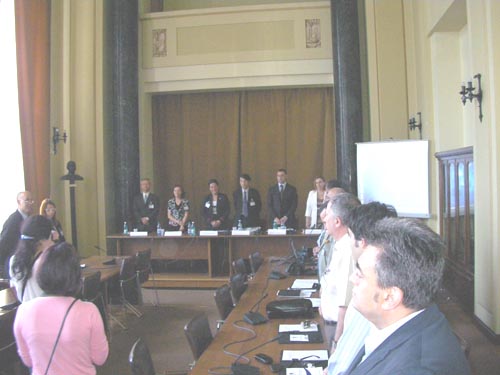Attending the International Conference on Administration and Business

The Faculty of Business and Administration from the University of Bucharest is organizing the International Conference on Administration and Business during June 4-5, 2010. I am attending the Education, Administration and Law Section, with the paper “Online vs. Offline vs. Mixed Participation for Better Governmental Policy-Making.” This paper is focusing on the area of participative democracy from my thesis. Here are some conclusions:
SolveNet (term referring to a hypothetical better citizen engagement model) is a combination of online and offline citizen engagement. It benefits from advantages specific to the online dialogue like little to no cost of use, flexibility of participants to give solutions to problems of public concern, educational approach, and interactivity among the participants. At the same time, SolveNet is coping with the disadvantages of offline engagement, like the lack of accountability of the end result of a participation endeavor, limited time and money of participants to offer input in pressing community problems, polarization of discussions, and lack of knowledge about issues.
As the majority of the work is done online, the policy-making process is pushed further using the authority of a legally established
nonprofit organization. This way, the most feasible, valuable and sustainable solution proposals from citizens, are sent to the desks of elected and appointed officials.
The participation model lacks the advantages of face-to-face discussions between the participants, but the online citizen engagement platform offers an interactive participation experience that allows people from different regions to work together creatively in solving community problems. The people who participate are not representative for any given community. That is why the main focus is on the quality of the solutions that are exchanged on the platform and not on the background of the citizens.
SolveNet faces however the problem that every participation model has: effectiveness in generating a change of policy. It is ultimately up to the decision-makers to consider the results of any participative democracy exercise or not. The main advantage of SolveNet is in this case the little effort that every-day people make, in order to make their voices heard in the community.
A mixed participation model to support governmental decision-making seems to work the best, in order to benefit the most from citizen engagement. This model has to provide for authority, accountability, creativity, exchange of constructive ideas, educational approach, and perseverance. Future research could identify such a model and showcase it.

One Comment
Kevin Simons
This is great. I’m happy to see that you are so busy and thinking so deeply about government. It’s nicely written, too. I hope all is well in Romania.
Kevin